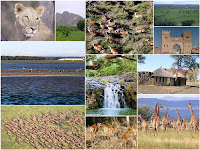Elgon Forest: Saved for Now
 A few moths ago, President Yoweri Museveni and the Ugandan government were in favor of giving away a part of the Mabira forest for the cultivation of sugar cane. Now, surprisingly and fortunately, Mr. Museveni has rejected plans to reduce Mount Elgon's forest cover and cede some 7,500 hectares for human settlement. The President noted that he must be convinced that reducing forest cover will not affect the ecological system of the country.
A few moths ago, President Yoweri Museveni and the Ugandan government were in favor of giving away a part of the Mabira forest for the cultivation of sugar cane. Now, surprisingly and fortunately, Mr. Museveni has rejected plans to reduce Mount Elgon's forest cover and cede some 7,500 hectares for human settlement. The President noted that he must be convinced that reducing forest cover will not affect the ecological system of the country.Mount Elgon, an extinct volcano, is the lowest of East Africa's four major volcanoes. Its surface area is one of largest of any extinct volcano in the world, indicating that it was once much taller than its current height, perhaps even taller than Kilimanjaro. A massive 40-square-kilometer caldera supports a large Afro-alpine moorland, with some unique endemic plants and more giant senecios (also called groundsels) than are found anywhere else in East Africa. On the Kenyan side, there are salt caves that are frequented by elephants and other animals.
Reducing forest cover on and around Mount Elgon will certainly affect the ecological system of the area and gradually have a devastating effect on the Mount Elgon zone. Already, Mount Elgon is directly succumbing to the effects of Global Warming. And human encroachment is only increasing to the destruction. Trees are being cut in large numbers for: charcoal, wood fuel, lumbering and illegal settlement. The Mount Elgon area, normally cool and green, is gradually changing for the worse; mosquitoes, once rare around the area - have now found a breeding ground in swamps created by human activity. And that means more and more cases of Malaria.
Most of Uganda has abundant and very fertile land; people can and should be settled in other parts. Not in an ecologically delicate place such as around Mount Elgon. For leaders and politicians to appease people and attract votes using such tactics, as some are doing now by trying to give away a part of Mount Elgon - is dangerous and short sighted. Hopefully, the Ugandan leadership and government will protect and conserve Mount Elgon's wilderness and environment.
Photo: anne logie


